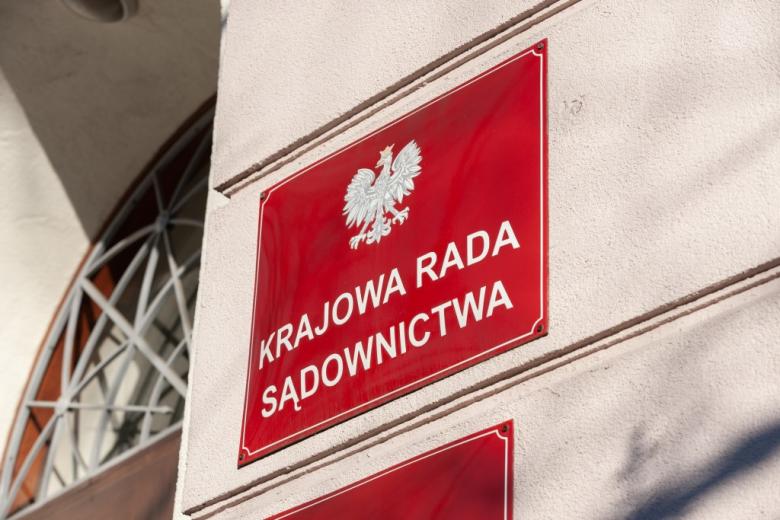Keep our news free from ads and paywalls by making a donation to support our work!

Notes from Poland is run by a small editorial team and is published by an independent, non-profit foundation that is funded through donations from our readers. We cannot do what we do without your support.
Poland’s justice ministry has presented a bill seeking to overhaul one of the institutions that has been at the heart of the country’s rule-of-law crisis. It wants to ensure that the National Council of the Judiciary (KRS), which is responsible for nominating judges, is independent of political control.
However, even if the legislation is approved by parliament, where the government has a majority, it appears likely that opposition-aligned President Karol Nawrocki will block it, just as his predecessor, Andrzej Duda, did last year with an earlier government effort to reform the KRS.
Justice minister Waldemar Żurek has appealed to Nawrocki to support the bill, saying that it is intended to be a “compromise” that takes into account Duda’s concerns about the previous proposal.
W nowej, legalnej Krajowej Radzie Sądownictwa głos znajdą przedstawiciele wszystkich szczebli sądownictwa.
To powrót do konstytucyjnych zasad – równej reprezentacji i niezależności od polityków. To najważniejsze.
Sądy rejonowe – 6 sędziów, okręgowe – 3, apelacyjne – 2, SN,…
— Waldemar Żurek (@w_zurek) November 6, 2025
In 2017, the then-ruling Law and Justice (PiS) government overhauled the way the KRS’s 25 members are selected. Previously, most were chosen by judges themselves. However, after PiS’s reforms, most were selected by politicians.
The move was widely condemned by expert bodies as undermining judicial independence. A number of Polish and European court rulings have found the KRS to no longer be a legitimate body due to its lack of independence.
That in turn has called into question the status of around 2,500 judges who have been appointed through the KRS since it was overhauled by PiS, and the huge number of rulings issued by them.
For example, around 60% of Supreme Court judges, including its chief justice, were nominated by the so-called “neo-KRS”.
At the end of 2023, PiS was removed from power and replaced by a new government, led by Prime Minister Donald Tusk, that pledged to restore the rule of law in Poland, including by depoliticising the KRS and restoring is legitimacy.
On Thursday, the justice minister outlined a bill that seeks to do that. Under its proposal, 15 members of the KRS would once again be elected by the judiciary through direct, secret elections in which all judges would be able to vote.
Meanwhile, candidates for the KRS would need at least ten years of judicial experience, including five in their current court. The National Electoral Commission (PKW) would oversee the process, verifying applications and, in what Żurek called a “novelty”, organising public hearings for candidates.
The justice minister also proposed creating a “social council” at the KRS, which would include representatives of legal professions and the ombudsman for human rights, who, he said, “will keep an eye on the KRS”.
Fifteen months since the change of government, Poland's rule-of-law crisis continues – indeed, many Poles think the situation has got worse.@J_Jaraczewski explains the roots of the crisis, what its impact has been, and how it might be resolved https://t.co/7KOCURV3dU
— Notes from Poland 🇵🇱 (@notesfrompoland) March 17, 2025
A previous attempt by Tusk’s government to reform the KRS was approved by parliament in April 2024. However, PiS-aligned President Duda refused to sign it into law, instead referring it to the Constitutional Tribunal (TK) for assessment.
Duda argued that the bill was unconstitutional because it ended the current KRS’s term prematurely. The TK – which is stacked with PiS-era judges and seen as being under the influence of the former ruling party – has still not ruled on the case. It has a hearing scheduled for later this month.
Żurek’s newly proposed bills, however, does not interrupt the existing term of KRS members. Appealing to Duda’s successor, Nawrocki, who is also aligned with PiS, Żurek wrote that the newly proposed bill is a “compromise” and urged him to support it.
Żurek i Markiewicz proponują, aby wrócić do systemu sądokracji. Sędziowie, którzy sami siebie wyłaniają, sami siebie rozliczają to przepis na państwo w państwie i główne źródło patologii polskiego sądownictwa. Dlatego należało to zmienić.
Jeśli po latach obowiązywania aktualnej…
— Sebastian Kaleta (@sjkaleta) November 6, 2025
However, PiS politicians immediately criticised Żurek’s plan as a return to a “judgeocracy”, in which judges are given too much power to police themselves without external oversight.
“Judges who appoint themselves and hold themselves accountable are a recipe for a state within a state and the main source of a pathological situation in the Polish judiciary,” said PiS MP and former deputy justice minister Sebastian Kaleta.
“That is why this had to be changed,” he coninued, adding that it was “worth considering whether judicial members should be elected not by judges, but by all citizens”.
Last month, the justice ministry also proposed separate legislation on how to deal with judges appointed after PiS rendered the KRS illegitimate. However, that bill, which is yet to be put to parliament, also faces a likely veto by Nawrocki.
Poland’s justice ministry has unveiled new plans for how to deal with the status of around 2,500 judges who were appointed by a body rendered illegitimate by the judicial reforms of the former PiS government, as well as rulings issued by them https://t.co/VxtDCoDiD7
— Notes from Poland 🇵🇱 (@notesfrompoland) October 9, 2025

Notes from Poland is run by a small editorial team and published by an independent, non-profit foundation that is funded through donations from our readers. We cannot do what we do without your support.
Main image credit: Grzegorz Krzyżewski/BRPO (under CC BY-NC-ND 3.0 PL)

Alicja Ptak is deputy editor-in-chief of Notes from Poland and a multimedia journalist. She has written for Clean Energy Wire and The Times, and she hosts her own podcast, The Warsaw Wire, on Poland’s economy and energy sector. She previously worked for Reuters.




















